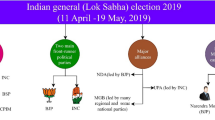Abstract
Twitter is a microblogging website where users read and write short messages on various topics every day. Political analysis using social media is getting attention of many researchers to understand the public opinion and trend especially during election time. In this paper, we propose a novel approach based on semantics and context aware rules to detect the public opinion and further predict election results. We crawled the political tweets during the general election in India, and further evaluate our proposed approach against the election results. Experimental results show the effectiveness of the proposed rules in determining the sentiment of the political tweets.
Access this chapter
Tax calculation will be finalised at checkout
Purchases are for personal use only
Similar content being viewed by others
References
Blenn, N., Charalampidou, K., Doerr, C.: Context-sensitive sentiment classification of short colloquial text. In: Proceedings of IFIP’12, pp. 97–108, Prague, Czech Republic (2012)
Mittal, N., Agarwal, B., Agarwal, S., Agarwal, S., Gupta, P.: A hybrid approach for twitter sentiment analysis. In: 10th International Conference on Natural Language Processing (ICON), pp. 116–120 (2013)
Agarwal, B., Mittal, N.: Prominent feature extraction for review analysis: an empirical study. J. Exp. Theor. Artif. Intell. (2014). doi:10.1080/0952813X.2014.977830
Subrahmanian, V.S., Reforgiato, D.: Ava: adjective-verb-adverb combinations for sentiment analysis. Intell. Syst. 23(4), 43–50 (2008)
Turney, P.: Thumbs up or thumbs down? Semantic orientation applied to unsupervised classification of reviews. In: Proceedings of 40th Meeting of the Association for Computational Linguistics, pp. 417–424, Philadelphia, PA (2002)
Taboada, M., Brooke, J., Tofiloski, M., Voll, K., Stede, M.: Lexicon-based methods for sentiment analysis. Comput. Linguis. 37(2), 267–307 (2011)
Esuli, A., Sebastiani, F.: SentiWordNet: a publicly available lexical resource for opinion mining. In: Proceedings of 5th International Conference on Language Resources and Evaluation (LREC), pp. 417–422 (2006)
Romanyshyn, M.: Rule-based sentiment analysis of ukrainian reviews. Int. J. Artif. Intell. Appl. 4(4), 103–111 (2013)
Kessler, J.S., Nicolov, N.: Targeting sentiment expressions through supervised ranking of linguistic configurations. In: 3rd International AAAI Conference on Weblogs and Social Media (2009)
Bandyopadhyay, S., Mallick, K.: A new path based hybrid measure for gene ontology similarity. IEEE/ACM Trans. Comput. Biol. Bioinform. 11(1), 116–127 (2014). doi:10.1109/TCBB.2013.149
Tumasjan, A., Sprenger, T.O., Sandner, P., Welpe, I.: Predicting elections with twitter: what 140 characters reveal about political sentiment. In: Proceedings of ICWSM (2010)
O’Connor, B., Balasubramanyan, R., Routledge, B.R., Smith, N.A.: From tweets to polls: linking text sentiment to public opinion time series. In: ICWSM (2010)
Bermingham, A., Smeaton, A.F.: On using twitter to monitor political sentiment and predict election results. In: Proceedings of the Workshop on Sentiment Analysis Where AI Meets Psychology (SAAIP 2011-IJCNLP), pp. 2–10, Chiang Mai, Thailand (2011)
Bakliwal, A., Foster, J., Puil, J.V.D., O’Brien, R., Tounsi, L., Hughes, M.: Sentiment analysis of political tweets: towards an accurate classifier. In: Proceedings of NAACL Workshop on Language Analysis in Social Media, pp. 49–58 (2011)
Riloff, E., Qadir, A., Surve, P., De Silva, L., Gilbert, N., Huang, R.: Sarcasm as contrast between a positive sentiment and negative situation. In: EMNLP 2013, pp. 704–714 (2013)
Di Caro, L., Grella, M.: Sentiment analysis via dependency parsing. Comput. Stan. Interfaces (2012)
Tan, L.K.W., Na, J.C., Theng, Y.L., Chang, K.: Phrase-level sentiment polarity classification using rule-based typed dependencies and additional complex phrases consideration. J. Comput. Sci. Technol. 27(3), 650–666 (2012)
De Marneffe, M., MacCartney, B., Manning, C.: Generating typed dependency parse from phrase structure parses. LREC (2006)
Gimpel, K., Schneider, N., O’Connor, B., Das, D., Mills, D., Eisenstein, J., Heilman, M., Yogatama, D., Flanigan, J., Smith, N.A.: Part-of-speech tagging for twitter: annotation, features, and experiments. In: Proceedings of ACL (2011)
Author information
Authors and Affiliations
Corresponding author
Editor information
Editors and Affiliations
Rights and permissions
Copyright information
© 2015 Springer India
About this paper
Cite this paper
Singhal, K., Agrawal, B., Mittal, N. (2015). Modeling Indian General Elections: Sentiment Analysis of Political Twitter Data. In: Mandal, J., Satapathy, S., Kumar Sanyal, M., Sarkar, P., Mukhopadhyay, A. (eds) Information Systems Design and Intelligent Applications. Advances in Intelligent Systems and Computing, vol 339. Springer, New Delhi. https://doi.org/10.1007/978-81-322-2250-7_46
Download citation
DOI: https://doi.org/10.1007/978-81-322-2250-7_46
Published:
Publisher Name: Springer, New Delhi
Print ISBN: 978-81-322-2249-1
Online ISBN: 978-81-322-2250-7
eBook Packages: EngineeringEngineering (R0)





